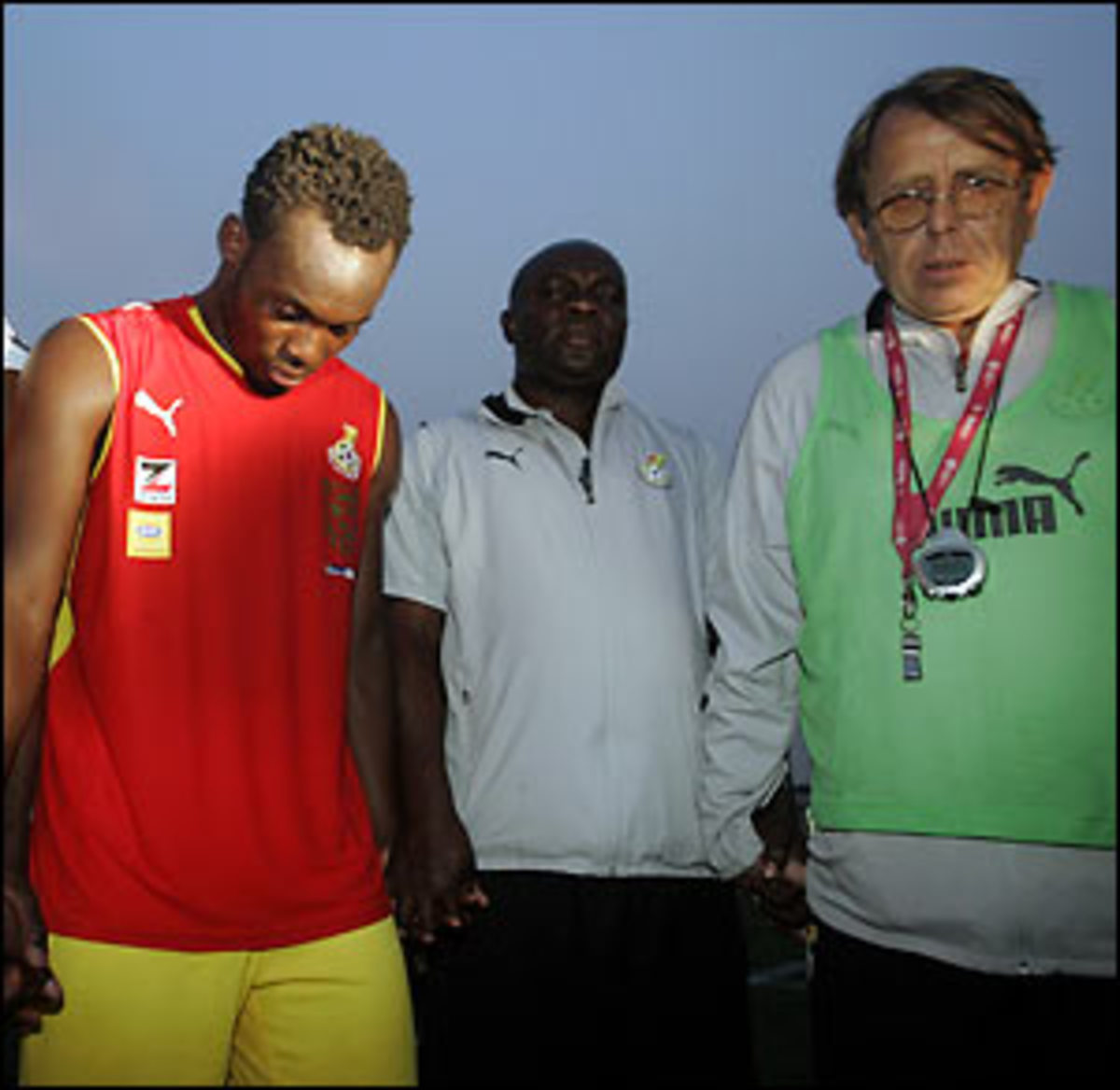Vive Le Roy!
ACCRA, Ghana -- The Ghanaian national team practices at the Elwak, a small stadium on a military base. Presumably, the army teams play here, while their generals watch from the leather recliners in the south stand. The grass is overgrown, like all the fields in Ghana, but the field is smooth and there's a tall, barbed-wire wall around the complex to keep the riffraff out.
The most determined kids, however, climb up onto the high roofs of nearby buildings to watch their beloved Black Stars train. It's worth the risk.
Ghana's training is passion play, of sorts. A day before their African Cup of Nations group stage match against Namibia, the side looked very relaxed, joking around, if not always appearing game sharp. The looseness is partly a consequence of the Black Stars' winning start to the tournament, and partly a reflection of their coach, the Frenchman Claude Le Roy, who seems to relish every minute in the wild unpredictably of African soccer.
In between providing insightful instruction to young players like Dede Ayew, Le Roy urges his team to smile and soak up the atmosphere. He darts around the field, constantly pushing his long, blond hair out of his eyes and shrugging off anything out of the ordinary. He uses a unique Frenglish patois with his players. "Deux more minutes!" he cried, as the opening five-on-two drill wound down.
Le Roy has become a national hero since Ghana beat Guinea 2-1 in the tournament's opener. They see him as an old sage, who's unafraid to speak bluntly. At a recent press conference, he was asked why he removed Quincy Owusu-Abeyie in the 75th minute of the Guinea match. The quick, active Quincy was a fan favorite.
But Le Roy defended himself, saying, "People have to think: When a coach makes a change, it is not a sanction against the player taken out. It is not about the player who comes off. It is about the player who is coming on."
Le Roy's style and clear-speaking has become a necessary tactic for the Black Stars, because of the intense pressure the team is under to succeed. Ghanaians are crying out for the team to come through and win the cup.
"Black Stars have to win," they say. This is both a hopeful statement and a demand of sorts, based seemingly on the people's desire to win some hardware in return for losing one of their most precious commodities: their players. The chorus of a popular song on the radio illuminates mood:
Black Star, Ghanaians We gave you food, supporting all you do. So go, go for the Cup Make us proud, Go Ghana, Go!
The players knew this pressure was going to be on them. How could it not be? They are playing in their homeland, even though only two team members, Fatau Dauda and Kwadwo Asamoah, play in the Ghanaian league.
"Yes, there is a lot of pressure," Ghana captain John Mensah told me after practice. "There are very high expectations for the team. But we're above pressure. We must be. It is not easy, but we are determined. We are ready to win the Cup."
At Elwak, as training was winding down, the players gathered in a circle and started singing and clapping. Le Roy and the other two or three white men on the coaching staff joined in. Even Stephen Appiah, the injured captain and inspirational force within the side, limped to the circle.
Then, like a grade-school game or a tribal dance, the team elders started calling out names and players entered the circle to dance alone. Michael Essien, ever the footballer, did a head-ball waltz, jumping every few steps and heading an imaginary ball. Nineteen-year-old Asamoah shimmied like he'd been tazed. Everyone laughed and sang a little louder.
Finally, they stopped singing, clutched hands, and prayed. "Amen," they said together, softly.
They walked off the field, trailed by a few of the more slippery kids. "Can't you see I am talking to someone?" Mensah reprimanded one persistent young fan while talking to me. The child shrunk away. However, before getting on the team bus, a gleaming custom-made vehicle emblazoned with the Ghanaian flag and a massive Puma logo, he gave the kid an autograph.
"It has been marvelous to come home," Mensah said. "The supporters were waiting for us when we came here from our training camp in Dubai. It was marvelous. So our motivation is very high. We want to make our nation proud."






